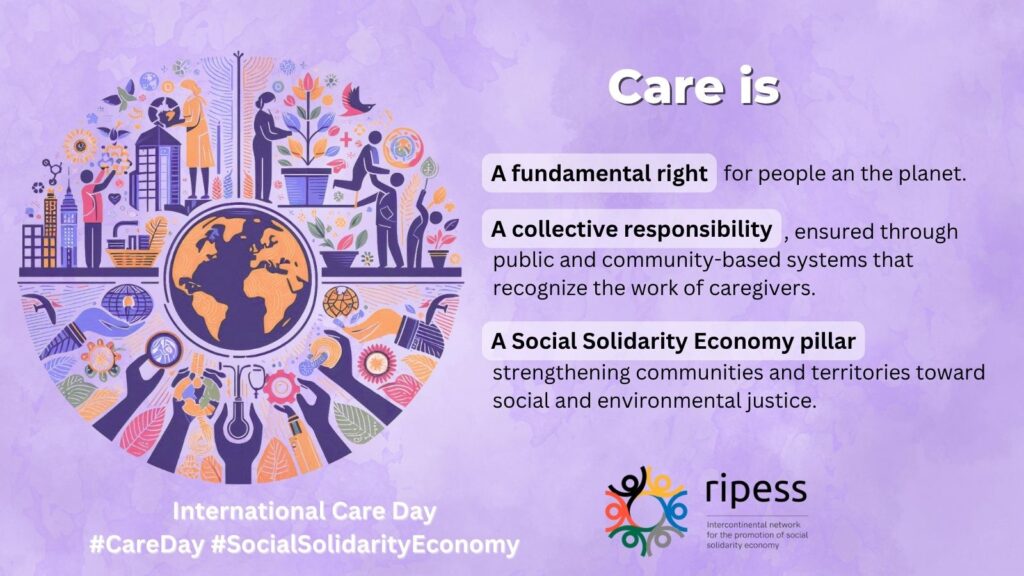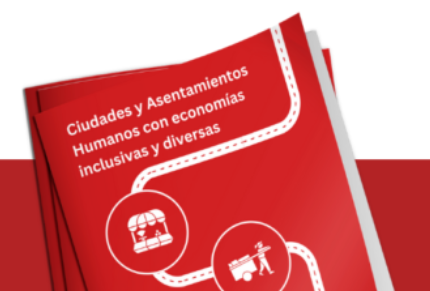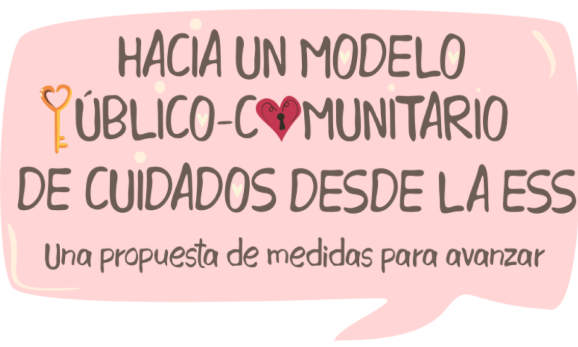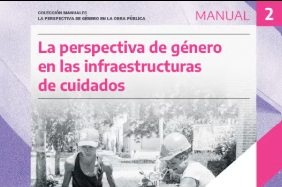
On the occasion of the International Day of Care and Support (29 October 2025), RIPESS launches a global campaign to open a collective dialogue on the deep meaning of care — a political, community-based and transformative act that sustains life in the face of commodification and extractivism.
The care economy encompasses all activities, relationships and services aimed at sustaining and improving life. However, these have historically been rendered invisible and undervalued by the dominant economic system. The 2024 ILO Resolution on decent work and the care economy recognizes the need to redistribute care work equitably, incorporate social co-responsibility, and highlight the role of the Social and Solidarity Economy (SSE) as a people-centered and community-based alternative that promotes collective well-being.
From an ecofeminist and intersectional perspective, the SSE reclaims care work—both paid and unpaid—as a public good and a human right, placing the sustainability of life at the center of the economy. During the COVID-19 pandemic, SSE networks and organizations demonstrated remarkable community resilience, sustaining life and solidarity where public systems were absent, particularly in contexts where women, migrants and racialized communities carry the main burden of care.
The SSE advances models that break with extractivist and patriarchal logics, strengthen community-based care systems, and promote transformative public policies that guarantee gender equity, decent work and social inclusion.
This campaign, led by the RIPESS Gender Commission, builds on previous work on care, ecofeminism and social justice, and amplifies the experiences of women, youth, Indigenous peoples, rural communities, migrants and care workers across Africa, Asia, Europe and Latin America.
Through shared messages, videos and testimonies, we invite everyone to join the conversation and respond:
And for you, what is care?
Because to care is to resist.
To care is to transform.
To care is to build other possible worlds — rooted in solidarity, equity and the sustainability of life.
What is the future of the Care Economy?
Watch the video with the key messages from our members and allies from different regions who are committed to care work with a Social Solidarity Economy perspective in their local contexts.
Recognition of Care in Global Agendas
The recognition of care as a key axis for equity and sustainable development is advancing in the international arena:
SDG 5.4 of the Agenda 2030
ILO Convention 189 (2011)
Resolution A/RES/77/281 (2023)
This objective seeks to ‘recognise and value unpaid care and domestic work through the provision of public services, infrastructure and social protection policies and the promotion of shared responsibility within the household and the family as nationally appropriate’.
This convention, on domestic workers, encourages states to ‘adopt measures to ensure the effective promotion and protection of the human rights of all persons engaged in domestic work’.
This UN resolution recognises the role of the Social and Solidarity Economy in implementing the Sustainable Development Goals (SDGs) and in the construction of sustainable and inclusive economic models.
International Day of Care and Support (29 October)
ILO resolution concerning decent work and the care economy (2024)
The UN declaration emphasises that ‘care work worldwide continues to be characterised by a lack of benefits and protections, low pay or lack of compensation, and exposure to physical, mental and, in some cases, sexual harm. It is clear that new solutions are needed on two fronts: with regard to the nature and provision of care policies and services, and to the terms and conditions of care work’
These efforts represent a step towards transforming the unequal division of care work between men and women into a more egalitarian organisation of care, promoting social co-responsibility between the state, the private sector, families, the social and solidarity economy (SSE) and the community (ILO, 2024, p. 2)
Resources on Care with an SSE Perspective
Together we are compiling materials that are already advancing the recognition, redistribution and enhancement of the right to care with a view to the Social and Solidarity Economy. If any relevant material is missing, please let us know at: info@ripess.org. Thank you!



A publication that seeks to highlight the Right to the City approach to diverse and inclusive economies, with its three pillars: the social and solidarity economy, the informal economy and the care economy.
By: Global Platform for the Right to the City, RIPESS, Streetnet, WIEGO and Urgenci.
A document of measures and proposals for moving towards a care model that puts life at the centre from a public-community perspective.
By: ekoSolFem, the group working on the feminist proposal of REAS Euskadi
A practical tool with theoretical content to guide political action and contribute to the incorporation of the gender perspective in the public works cycle.
By: Ana Falú and UN Women


